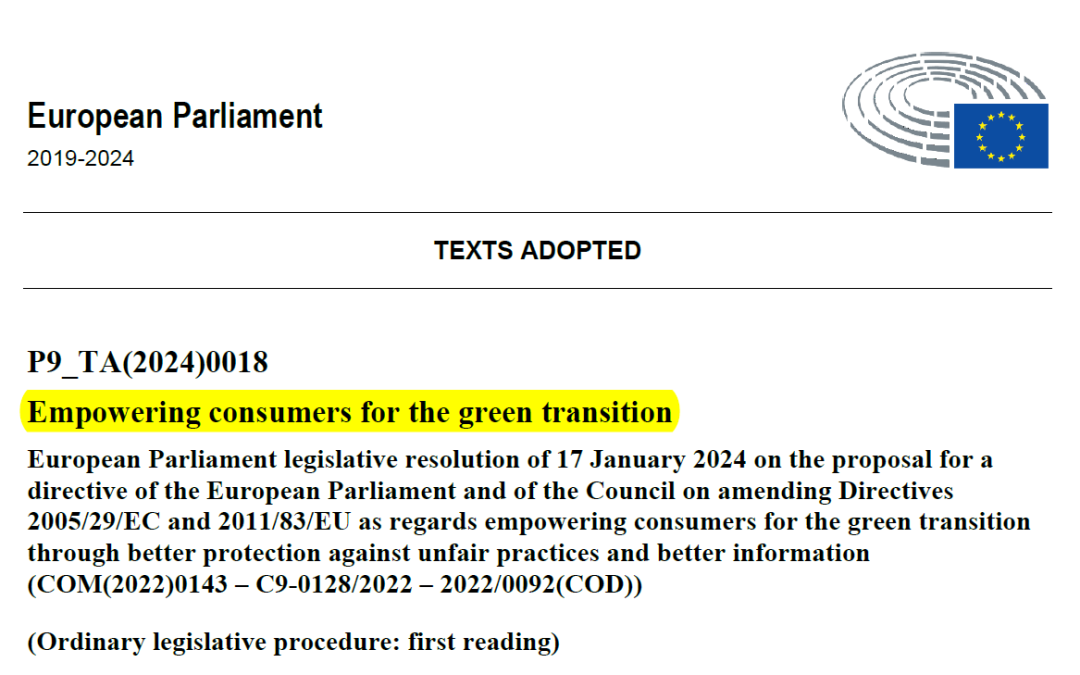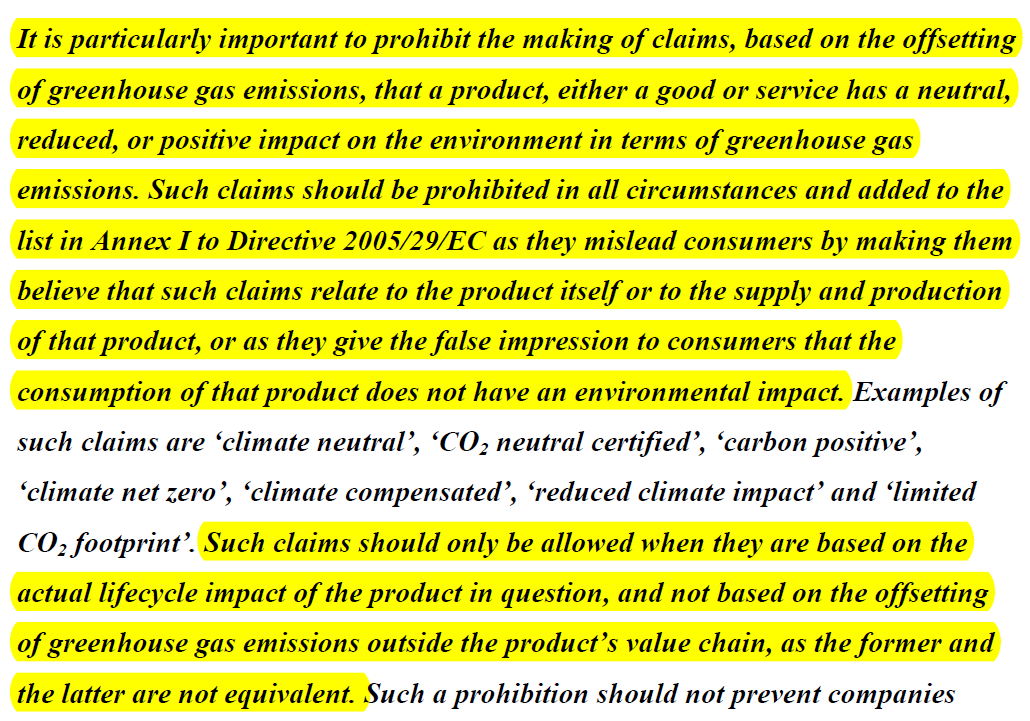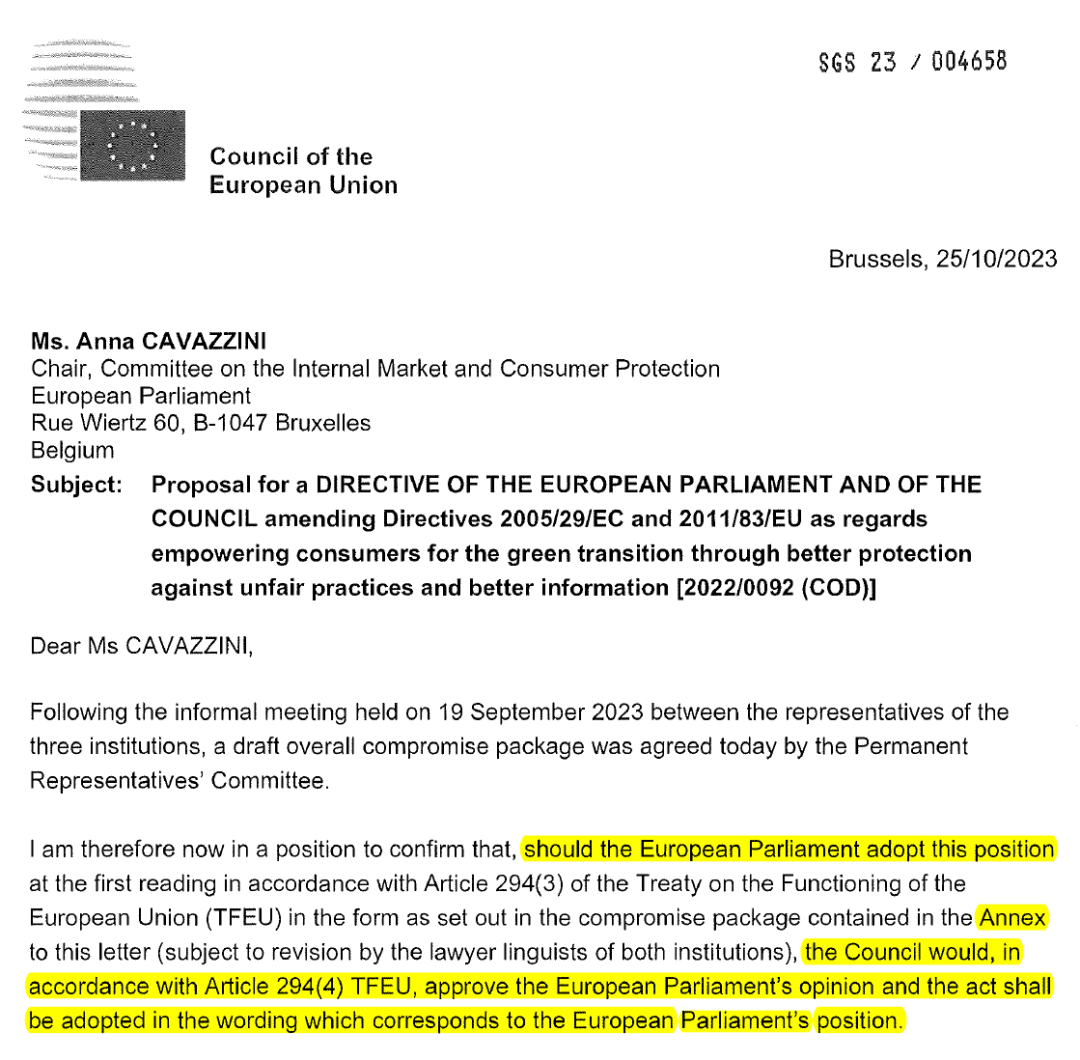The European Union is about to pass legislation, and the era of "carbon neutral" labels is coming to an end
On January 17, 2024, the European Parliament voted to approve a bill called: "Empowering consumers for the green transition". The significance of this law is that it will prohibit product or service providers from making environmental impact claims based on greenhouse gas emissions offsets. This means that after two years, it would be illegal to mislead consumers by advertising "zero-carbon products" or "carbon neutrality conferences" in the EU. This is an important legislative initiative of the EU to combat "greenwashing" and has far-reaching implications.

In September 2023, the author wrote an article on the progress of this legislation——What is the EU legislation prohibiting "carbon neutrality" claims on products?This article is an update on the latest developments. Note that this law has not yet been officially passed, but there is hardly any suspense left.
This "Empowering Consumers for the Green Transition" legislation amends two existing consumer protection regulations in the EU – the Unfair Business Practices Directive (Directive 2005/29/EC) and the Consumer Rights Directive (Directive 2011/83/EU). The purpose of this amendment is to prevent consumers from being misled by general environmental claims that do not provide evidence, such as "climate-friendly", "green", and "environment-friendly", which are currently flooding the market. In other words, it is a legal guarantee for EU consumers' "green right to know". On the other hand, the amendments also aim to prevent companies from gaining unfair competitive advantages through unsubstantiated "green" claims.
unscramble
The current EU Unfair Business Practices Directive prohibits two types of "unfair business practices": (1) misleading business practices and (2) aggressive business practices (e.g. door-to-door sales). The Directive is followed by a detailed list of acts that are expressly prohibited.
The amendments add four items of "misleading business practices" to the list of prohibited categories, all of which involve "greenwashing". The first three are:
1. Display uncertified or unofficial "sustainability labels";
2. A generic environmental claim without substantiation;
3. Environmental claims are specific to a product or company as a whole, but actually only relate to a specific aspect of the product or a specific activity of the company.
All three are relatively mild, and that is, to prohibit unsubstantiated, exaggerated environmental labels. And the fourth item is the ultimate move:
4. Based on greenhouse gas emissions offsets, claiming that the product has a neutralizing, reduced, or positive environmental impact in terms of greenhouse gas emissions.

This is to change the "carbon neutral" and "zero carbon" product labels, because the "carbon neutrality" of products must be inseparable from offsetting. No matter how hard you try, the supply chain of products will not be completely carbon-neutral. If you declare "carbon neutral" or "zero carbon", you must use carbon offsets, that is, buy other people's voluntary emission reductions to offset some of your own emissions. The European Union wants to pass legislation to prohibit this practice, arguing that it misleads consumers and leads to unfair competition.
At least on the EU's side, there is less and less market for carbon offsets. Here are the exact words from the EU Act:
"It is particularly important that claims based on offsets of greenhouse gas emissions that a product, whether a good or a service, have a neutral, reduced, or positive impact on the environment in terms of greenhouse gas emissions, should be prohibited.
Such claims should be prohibited in any case, as they would mislead consumers into believing that they are related to the product itself or to the supply and production of the product, or because it would give consumers the false impression that the consumption of the product will not have an impact on the environment.
(Author's note: The logic of the above sentence is that in fact, the product itself is not zero-carbon, but buys other people's emission reductions to offset its own emissions.) Isn't this a very common problem? How do ordinary people know that the zero-carbon drinks they buy are not zero-carbon, and they can't be zero-carbon. )
Only environmental claims based on the actual life cycle impact of the product should be allowed, rather than offsetting greenhouse gas emissions outside the product's value chain, as the two are not the same.
(Author's note: The carbon reduction of enterprises can be promoted, but the carbon offsets they buy cannot be used to publicize, this is the attitude of the European Union.) )

Please note that "Products" includes goods and services. At least in the EU, it is no longer possible to say that events are "carbon neutral" in the future, and that flights cannot be said to be "carbon neutral". Anna Cavazzini, chair of the European Parliament's Internal Market and Consumer Protection Committee, said after the bill was voted that planting trees in the rainforest in the future will not make the World Cup carbon neutral, referring to the 2022 Qatar World Cup declaration of "carbon neutrality", which was questioned by many environmental groups at the time.
comments
The EU legislation is backed by deep skepticism about carbon credits and emissions reductions through offsetting, as well as a long-term push by consumer protection groups. Its impact on carbon offsets should not be underestimated. The European Union has long banned the use of carbon offsets for compliance on the Mandatory Carbon Market (EUETS). The regulation also blocks the maximum use of carbon offsets in the voluntary emission reduction market. Will it be a watershed moment in the development of voluntary carbon markets, and will it have an indirect psychological impact on China's CCER?
Combating "greenwashing" has become an important direction of EU green legislation. In this policy direction, EU legislation is multi-pronged. In addition to the regulations discussed in this article, which are in the final stages of consumer protection, two other important pieces of legislation are in the final stages – the Green claims directive, which regulates environmental claims, and the Carbon removal certification framework, which regulates the quality of carbon removals.
In order to avoid misinterpretation, it is important to emphasize that the EU is not not doing carbon neutrality. Carbon neutrality itself is not a problem, but the lack of standards, evidence, and authenticity to casually claim "carbon neutrality" is the problem to be solved by EU legislation. If we are serious about pursuing green, we must ensure the authenticity of green, which is a logical logic. The EU's green legislation often takes the lead and may trigger other countries to follow suit or follow suit. Be aware of the megatrends in the outside world.
Follow-up legislative process
What was approved by the European Parliament on 17 January 2024 is a "compromise text" after tripartite consultations. The legislation is one of the last steps away from its final pass, which is approval by the Council of the European Union. There is hardly any suspense in this, because the Council has already formally sent a letter to the European Parliament on October 25, 2023, saying that if you approve it, I will approve it.
Once the Act has been published in the Official Journal of the European Union and has entered into force, EU Member States have 24 months to amend their national laws to implement the revised EU Directive. But we don't have to wait until then for the effects of the "Empowering Consumers for Green Transition" legislation to be felt, and the era of "carbon neutral" labels may come to an early end.








